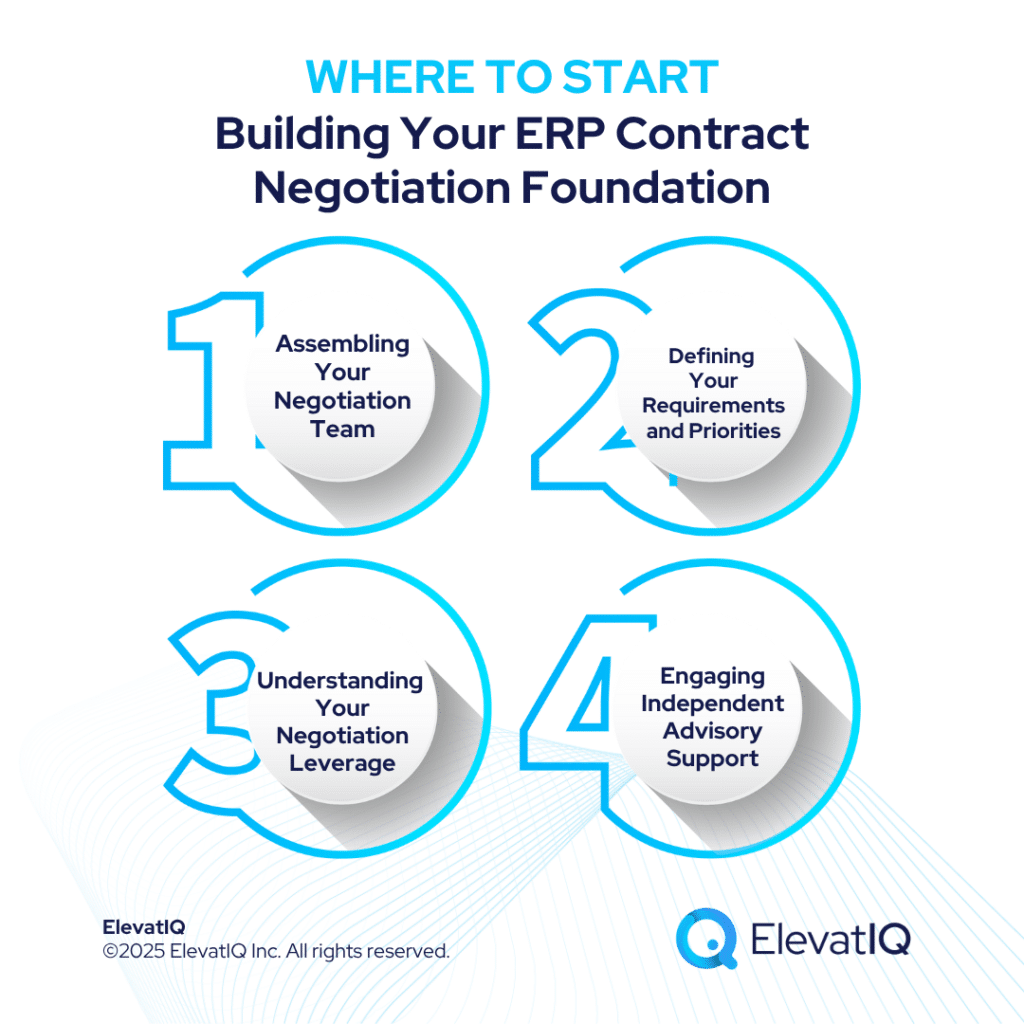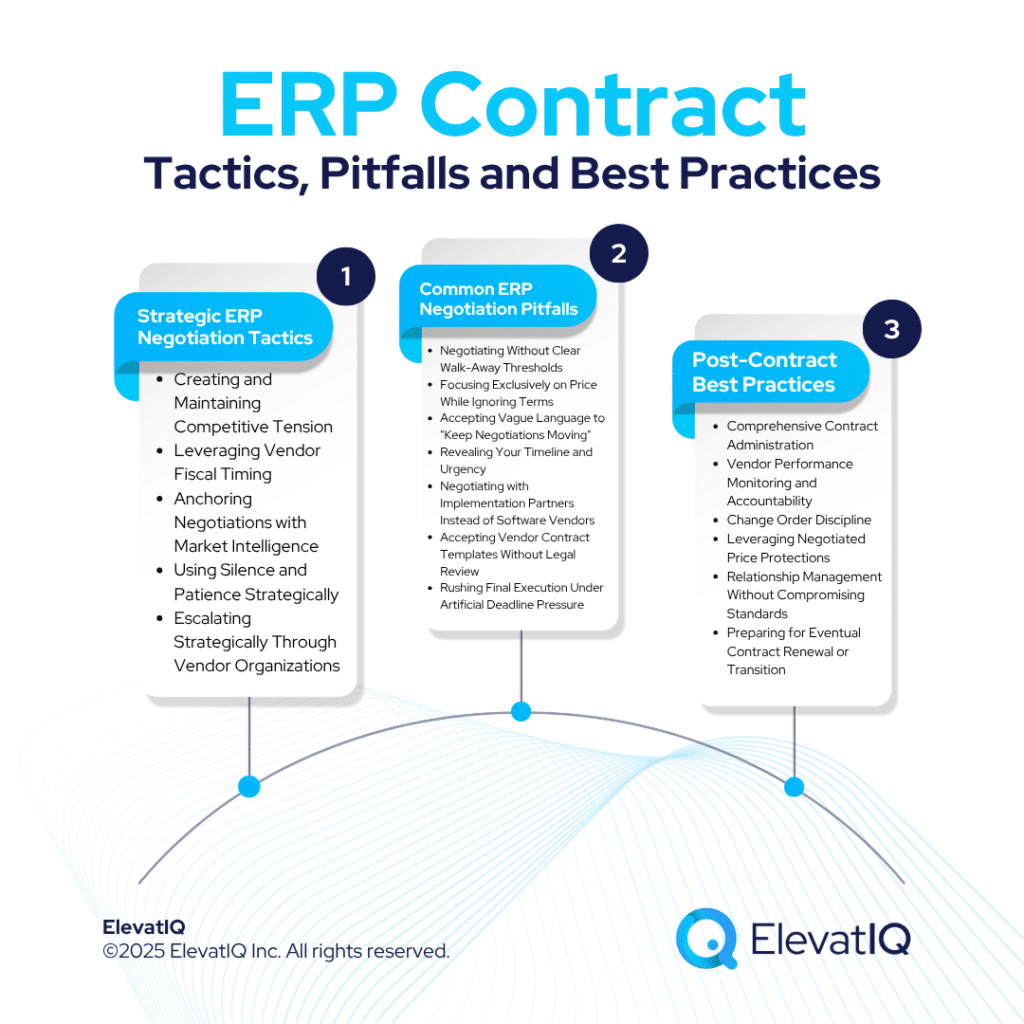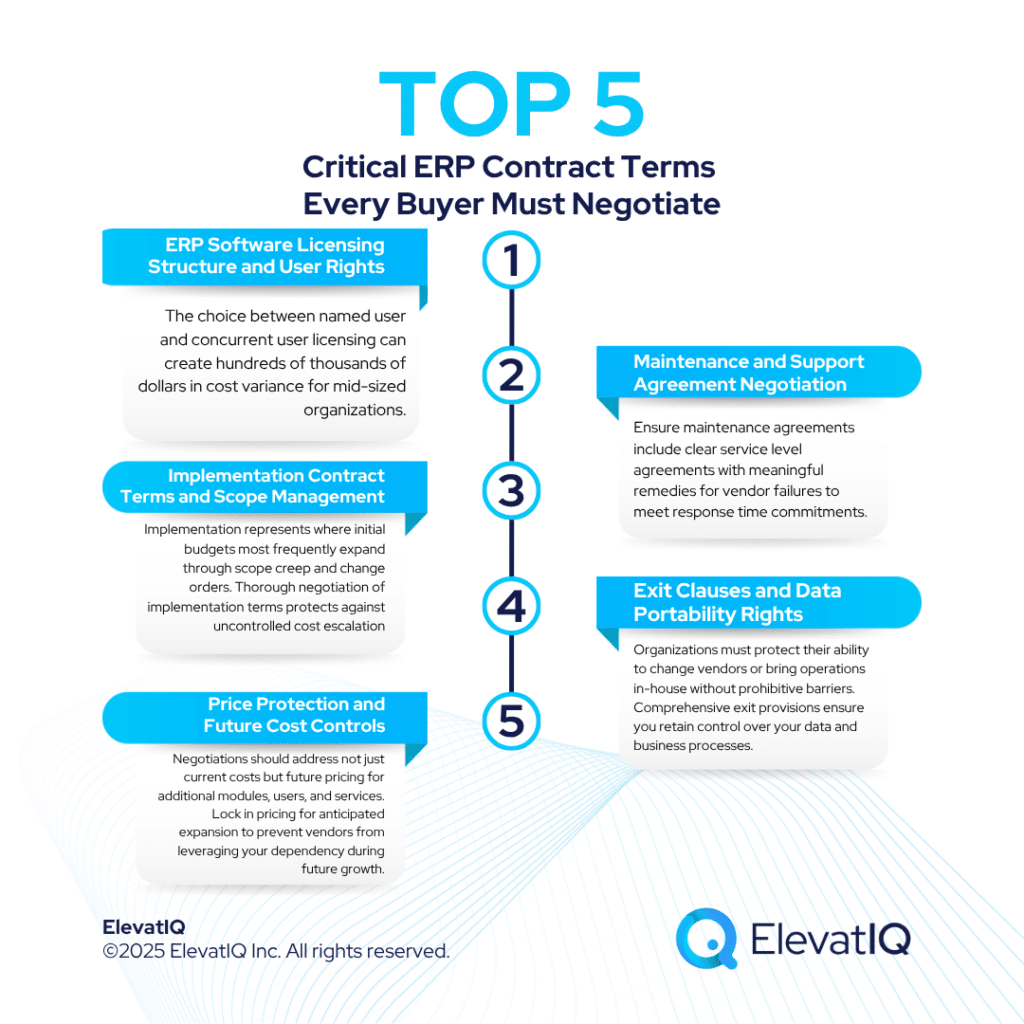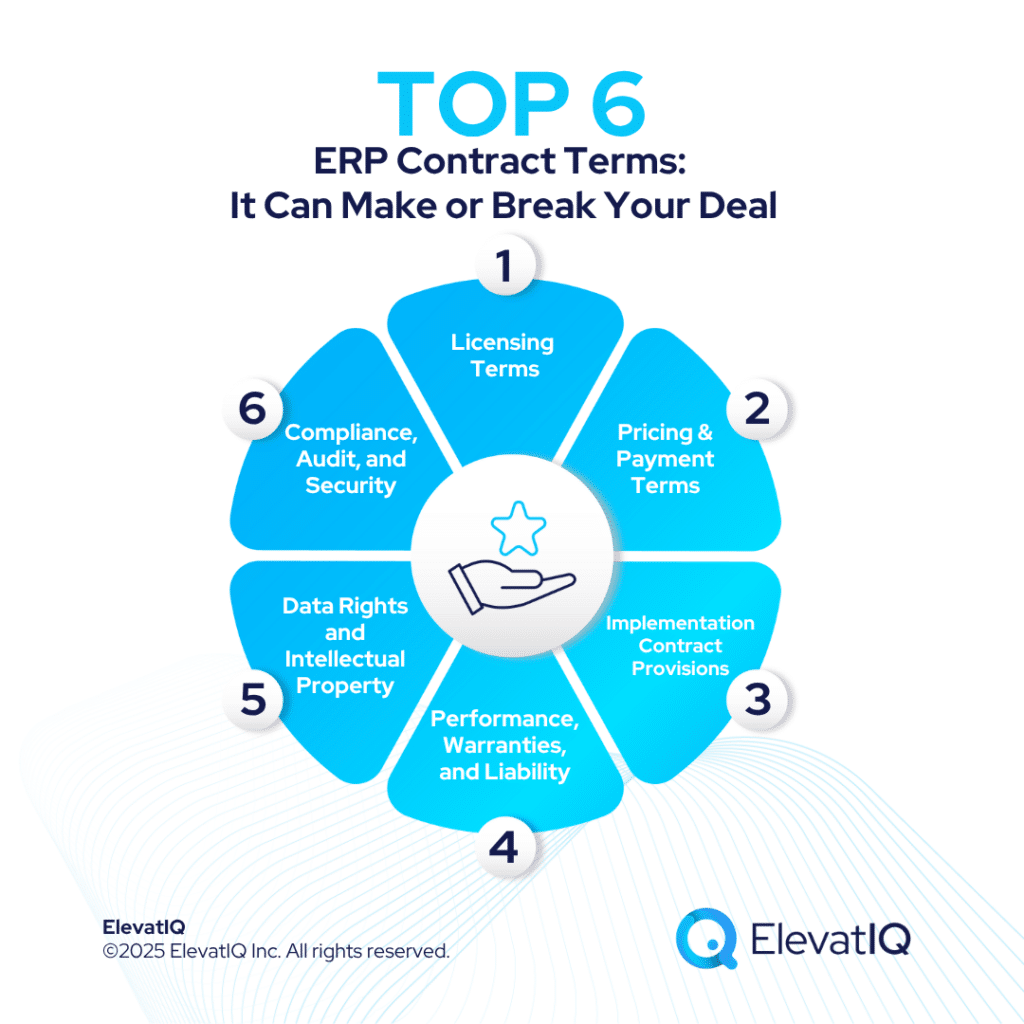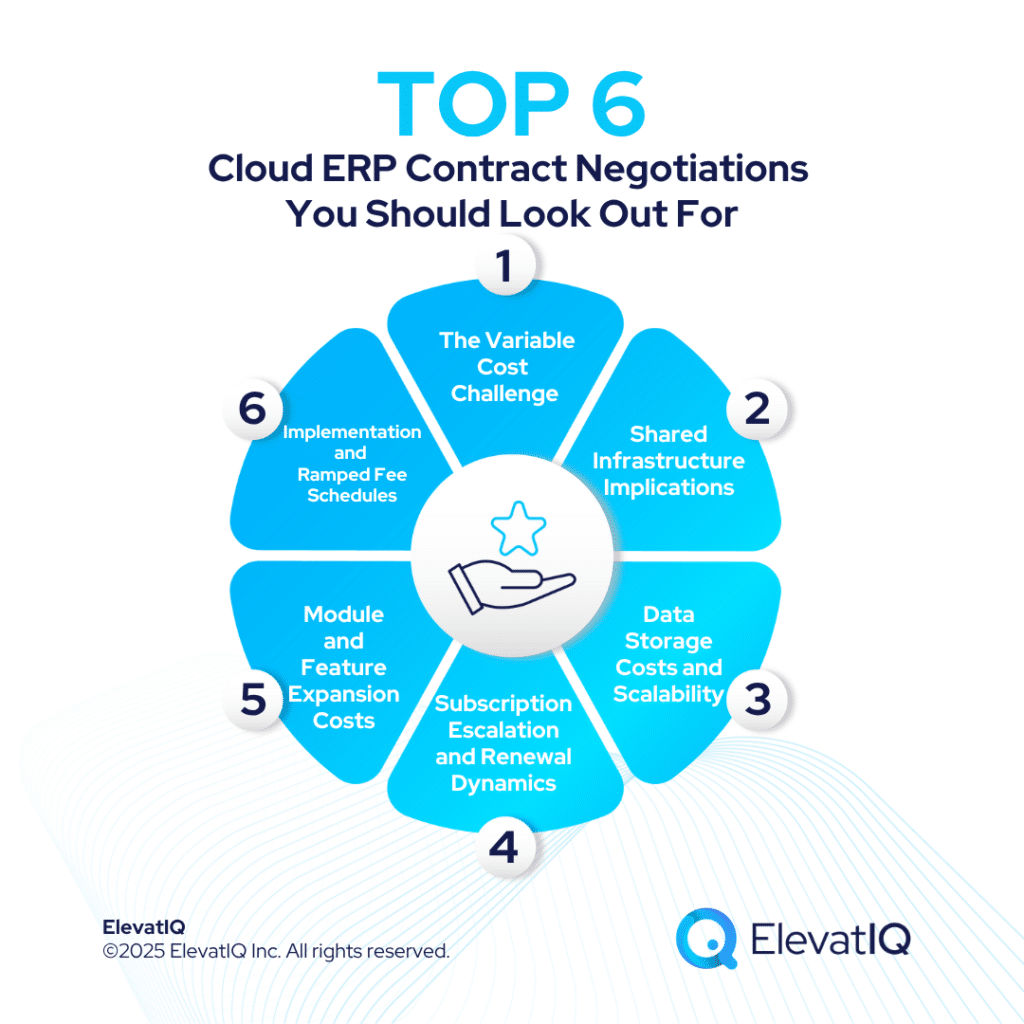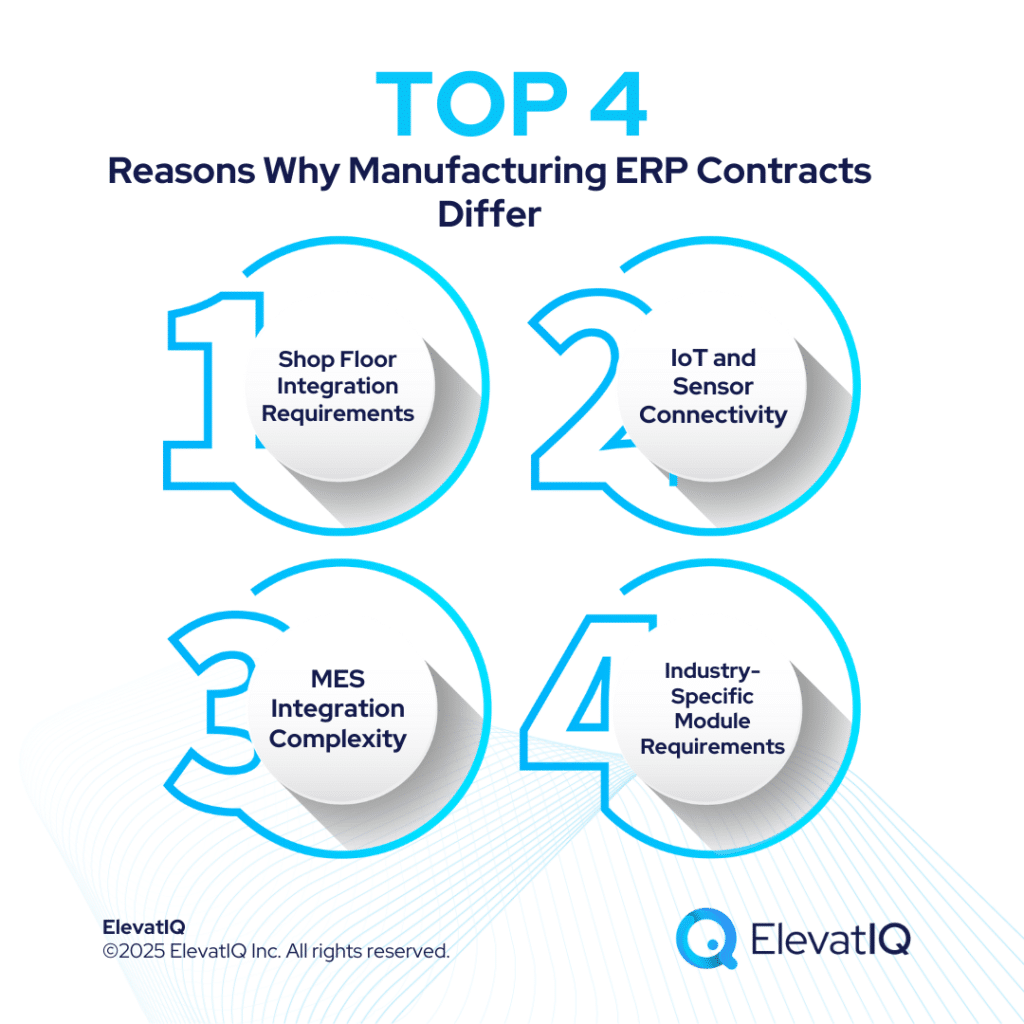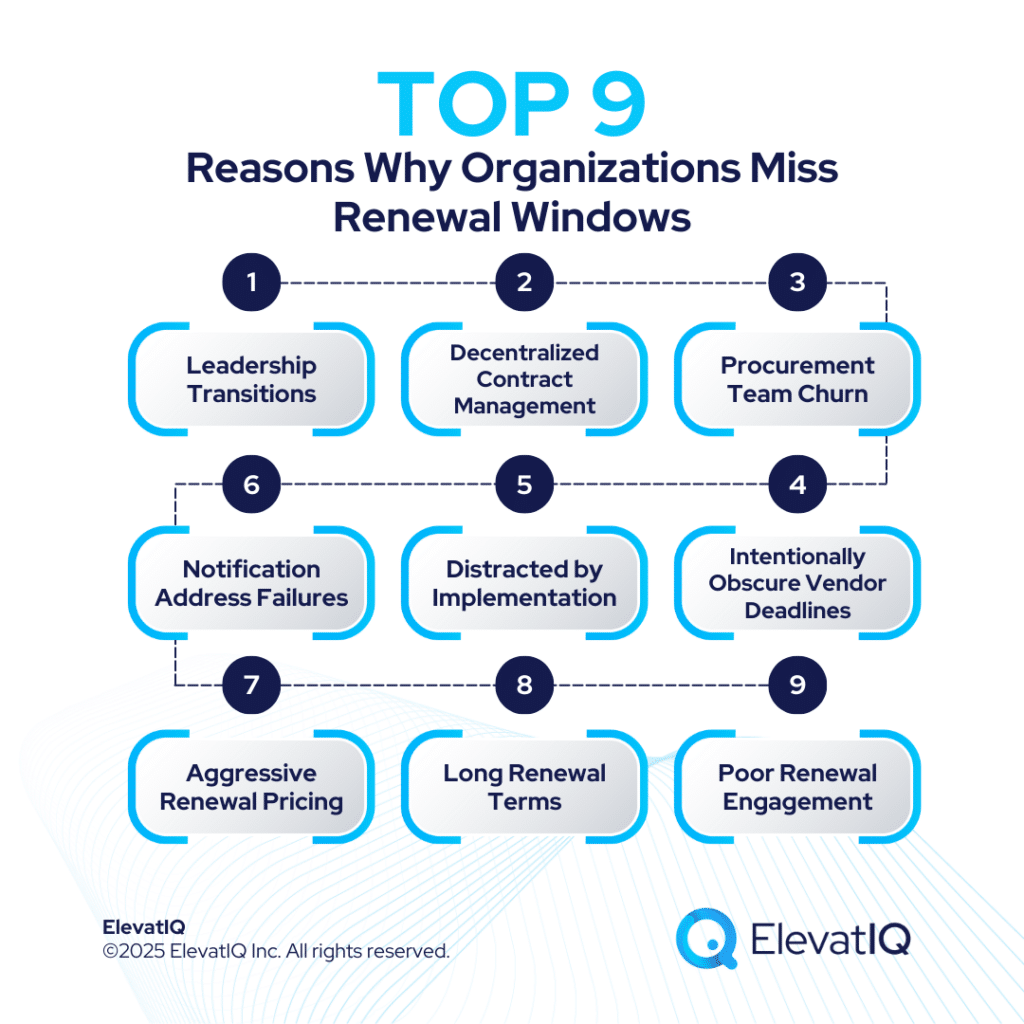Last Updated on October 21, 2025 by Shrestha Dash
Enterprise resource planning implementations represent transformational investments that reshape how organizations operate, compete, and grow. Yet despite their strategic importance, many companies approach ERP contract negotiations as a procurement formality rather than a critical success factor that determines project outcomes for years to come.
The financial stakes alone demand serious attention. Mid-sized organizations typically invest $1-10 million in ERP implementations, while large enterprises often exceed $50 million when accounting for software licensing, implementation services, infrastructure, and ongoing support. Beyond these direct costs, poorly negotiated contracts create hidden financial burdens, operational constraints, and risk exposures that compound throughout the system lifecycle. Understanding why ERP contract negotiation matters and how to approach it strategically separates successful implementations from problematic deployments that fail to deliver expected business value.
The Strategic Importance of ERP Contract Negotiations
ERP contracts function as the constitutional documents governing technology relationships that typically span 5-10 years or longer. These agreements establish not just pricing but the fundamental terms that determine operational flexibility, cost predictability, vendor accountability, and your organization’s ability to adapt as business requirements evolve.
Financial Impact Beyond Initial Pricing
While upfront license and implementation costs capture immediate attention, the total cost of ownership extends far beyond initial expenditures. Annual maintenance fees, upgrade costs, additional user licenses, supplemental modules, and professional services for customizations create ongoing financial obligations that often exceed original licensing investments over time.
For cloud ERP deployments, subscription models create ongoing costs that compound through annual price increases, user expansion charges, and consumption-based billing that escalates with transaction volumes or data storage growth. Organizations without negotiated pricing protections frequently encounter 5-10% annual subscription increases that dramatically inflate total ownership costs over multi-year contracts.
On-premises deployments still prevalent in many enterprises face similar long-term cost pressures through annual maintenance fees (typically 18-22% of license value) that increase 3-8% annually through escalation clauses. A $500,000 annual maintenance obligation can grow to over $900,000 within a decade through compounding increases—a financial reality many organizations fail to anticipate during initial negotiations. Strategic contract negotiation addresses these long-term financial implications upfront, establishing cost controls, price protection mechanisms, and clear boundaries around future expenditures that preserve budget predictability throughout the contract lifecycle.
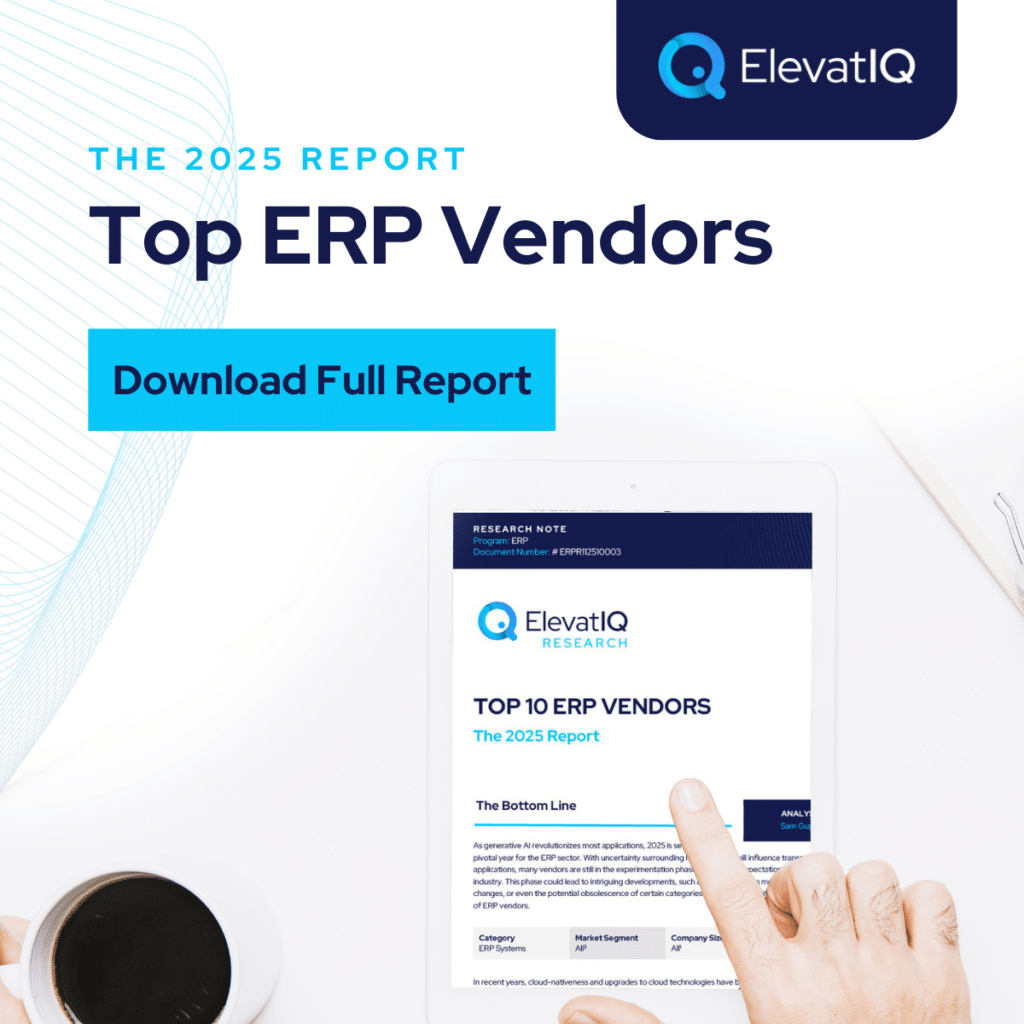
Operational Flexibility and Business Agility
Business conditions change constantly. Organizations merge, divest business units, expand internationally, enter new markets, and fundamentally transform their operating models. ERP contracts either enable or constrain your ability to adapt technology investments to evolving business requirements.
Restrictive licensing terms, inflexible contract structures, and poorly defined scope boundaries create friction when business changes demand technology adjustments. Companies discovering they cannot reassign user licenses across acquired entities, add international subsidiaries without prohibitive costs, or modify implementations to support new business models find themselves locked into arrangements that inhibit rather than enable business agility. Negotiating contracts with operational flexibility in mind ensures your ERP investment adapts to future business needs rather than becoming a constraint on strategic initiatives.
Risk Allocation and Vendor Accountability
ERP implementations carry substantial execution risk. Despite careful planning, projects encounter scope disagreements, timeline delays, budget overruns, and performance issues that threaten business operations. How contracts allocate risk between buyers and vendors fundamentally impacts who bears the financial and operational consequences when problems emerge.
Standard vendor contracts typically limit liability to amounts paid, provide minimal performance guarantees, and place execution risk primarily on buyers. These one-sided terms leave organizations vulnerable to project failures while vendors face limited accountability for poor delivery. Strategic negotiation rebalances risk allocation, establishing clear performance expectations, meaningful remedies for vendor failures, and protections that align vendor incentives with successful project outcomes.
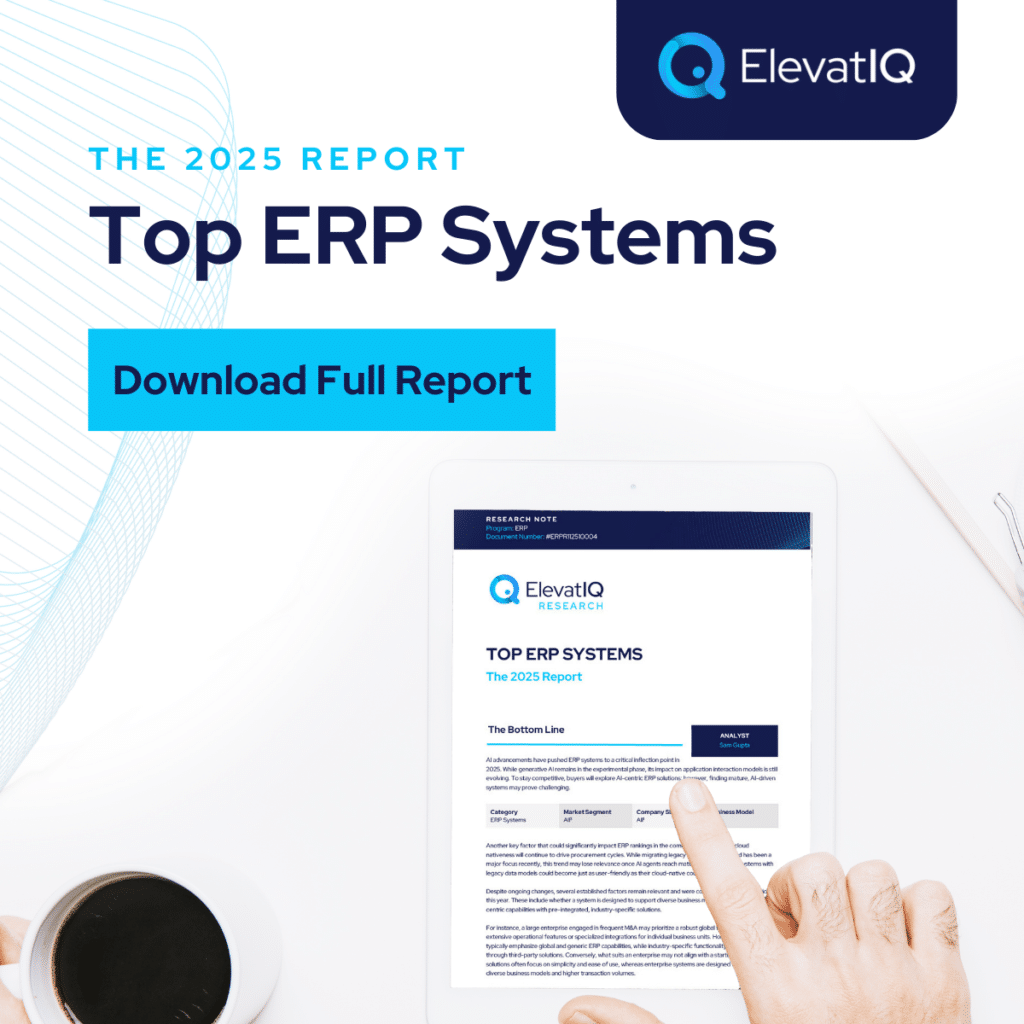
Understanding ERP Implementation Failure Rates
The urgency of effective contract negotiation becomes clear when examining industry implementation success rates. Research indicates ERP failure rates can reach 50-75%, depending on industry and project scope, with failures ranging from partial functionality shortfalls to complete project abandonment.
While many factors contribute to implementation challenges, contract terms directly influence several critical success elements. Vague scope definitions enable disputes over deliverables. Weak performance commitments reduce vendor accountability. Inadequate change management provisions create cost escalation. Limited liability protections leave organizations bearing financial consequences of vendor failures.
Organizations that invest effort in comprehensive contract negotiations before implementation begins establish stronger foundations for project success by clarifying expectations, aligning incentives, and creating accountability mechanisms that drive effective vendor performance.
Common Misconceptions About ERP Contract Negotiations
Several misconceptions prevent organizations from approaching ERP contract negotiations with appropriate strategic focus.
“Vendors Won’t Negotiate Standard Terms”
Enterprise software vendors maintain standard contract templates that heavily favor their interests. However, the notion that these terms are non-negotiable represents vendor negotiation positioning rather than reality. Virtually every contract element remains open to negotiation for buyers who understand leverage points and approach discussions strategically. Vendors negotiate thousands of agreements annually and expect sophisticated buyers to push back on standard terms. Sales representatives operate with significant pricing and terms flexibility, particularly when facing competitive pressure or approaching fiscal deadlines.
“Negotiation Damages Vendor Relationships”
Some organizations avoid aggressive negotiation, fearing it will create adversarial relationships that undermine implementation partnerships. This concern confuses professional negotiation with unprofessional behavior. Vendors respect buyers who negotiate competently and establish clear, fair contractual frameworks. Strong negotiation creates mutual understanding of expectations and obligations, actually strengthening long-term relationships by preventing the disputes that arise from ambiguous, one-sided agreements.
What damages relationships is dishonest negotiating tactics, unrealistic demands, or adversarial approaches that demonstrate lack of good faith. Professional, informed negotiation builds respect and establishes productive working partnerships.
“We Can Renegotiate Later If Problems Arise”
Perhaps the most dangerous misconception suggests organizations can address unfavorable contract terms later if issues emerge. In reality, renegotiating existing agreements from a position of operational dependency provides minimal leverage. Once implementation begins, vendors recognize you cannot easily switch platforms. Your negotiating position deteriorates dramatically as you become locked into their technology, processes, and ecosystems. The time to negotiate optimal terms is before commitment, when competitive alternatives provide meaningful leverage.

Where to Start: Building Your ERP Contract Negotiation Foundation
Effective ERP contract negotiation requires systematic preparation that begins well before engaging vendors in formal discussions.
Assembling Your Negotiation Team
Successful negotiations engage diverse expertise across multiple organizational functions. No single individual possesses all the knowledge required to evaluate complex ERP contracts comprehensively.
Your core negotiation team should include:
- Procurement Leadership: Brings vendor management expertise, negotiation tactics knowledge, and contract structuring experience. Procurement understands how to create competitive tension, identify leverage points, and navigate vendor negotiation dynamics.
- IT Leadership: Provides technical perspective on implementation requirements, integration complexity, infrastructure dependencies, and operational support needs. IT evaluates whether proposed technical terms and service commitments align with organizational capabilities and requirements.
- Finance Leadership: Models total cost of ownership, evaluates payment terms, analyzes budget impacts, and ensures financial terms align with organizational standards and cash flow considerations.
- Legal Counsel: Reviews contract structure, liability provisions, intellectual property terms, compliance requirements, and risk allocation. Legal ensures agreements protect organizational interests while meeting regulatory and governance standards.
- Business Operations Representatives: Contribute functional requirements knowledge, process expertise, and practical perspective on how contractual terms impact day-to-day operations and business objectives.
This cross-functional team structure ensures comprehensive evaluation while preventing any single perspective from dominating decisions that require balanced consideration across multiple dimensions.
Defining Your Requirements and Priorities
Before engaging vendors, establish clear understanding of what you need from both the ERP system and the contract terms governing your relationship.
- Functional Requirements: Document specific business processes, capabilities, and outcomes the ERP must deliver. These requirements directly inform scope definitions, acceptance criteria, and performance expectations embedded in contracts.
- Technical Requirements: Define integration needs, infrastructure dependencies, security standards, performance expectations, and technical specifications that contracts must address.
- Commercial Priorities: Establish your negotiation priorities across pricing, payment terms, licensing models, maintenance commitments, and financial protections. Understanding which terms matter most guides where to invest negotiation effort and where to offer flexibility.
- Risk Tolerance: Clarify organizational risk appetite regarding implementation approaches (fixed price vs. time and materials), liability limitations, performance guarantees, and vendor accountability mechanisms.
This upfront clarity provides the foundation for evaluating vendor proposals and engaging in focused negotiations that address terms most critical to your organization.
Understanding Your Negotiation Leverage
Leverage determines negotiation outcomes. Organizations that accurately assess and strategically deploy their leverage achieve significantly better contract terms than those negotiating without clear understanding of their negotiating position.
Primary leverage sources include:
- Competitive Alternatives: Credible alternative vendors provide the most powerful leverage. Vendors make their best offers when facing genuine risk of losing opportunities to competitors. This leverage requires conducting legitimate competitive evaluations rather than artificial positioning vendors recognize as tactical maneuvering.
- Timing: Vendor fiscal calendars create negotiation pressure points. Sales representatives facing quarter-end or year-end booking targets demonstrate increased flexibility as deadlines approach. Strategic timing of procurement processes to align with these pressure periods enhances leverage.
- Deal Size and Strategic Value: Larger opportunities and accounts vendors view as strategically important (reference potential, market expansion, competitive wins) generate more aggressive terms. Understanding how vendors value your opportunity informs realistic expectations.
- Market Conditions: Broader market dynamics influence vendor negotiating positions. Economic downturns, competitive intensity, and vendor growth pressures all create environments where vendors become more accommodating to secure business.
Engaging Independent Advisory Support
The complexity of ERP contracts and the specialized knowledge required for effective negotiation make independent advisory support valuable for most organizations. Enterprise technology selection consultants bring several advantages:
- Market Intelligence: Independent advisors maintain current visibility into pricing trends, contract terms, and negotiation outcomes across multiple vendors and industries. This market knowledge establishes realistic negotiation targets and identifies favorable terms other buyers achieve.
- Negotiation Expertise: Advisors specializing in ERP contracts understand vendor negotiation tactics, recognize standard contract traps, and deploy proven strategies that improve outcomes.
- Objective Perspective: Independent consultants without implementation practices or vendor partnerships provide unbiased guidance focused exclusively on buyer interests rather than mixed incentives.
- Negotiation Bandwidth: ERP contract negotiations demand substantial time and effort. Advisory support augments internal resources, allowing your team to focus on strategic decisions while consultants manage detailed contract review and negotiation execution.
Organizations that engage independent advisors typically achieve contract improvements that far exceed advisory costs through better pricing, more favorable terms, and avoided contractual pitfalls.
Establishing Your Negotiation Timeline
ERP contract negotiations require adequate time for thorough execution. Rushing through negotiations under artificial deadlines weakens your position and increases the likelihood of accepting unfavorable terms. A realistic negotiation timeline typically spans 4-8 weeks after vendor selection, depending on contract complexity and organizational decision processes. This timeframe allows for:
- Detailed contract review and issue identification
- Internal stakeholder alignment on priorities and positions
- Multiple negotiation rounds addressing key terms
- Legal review and risk assessment
- Executive approval processes
Organizations should plan procurement schedules that provide sufficient negotiation time while potentially aligning final negotiations with vendor fiscal pressure points that enhance leverage.
Preparing for Successful ERP Contract Negotiations
The art of ERP contract negotiation begins with recognizing its strategic importance, understanding common pitfalls, and investing in thorough preparation before engaging vendors in formal discussions. Organizations that approach negotiations strategically—assembling appropriate expertise, defining clear requirements, understanding leverage sources, and allocating sufficient time—establish foundations for securing contract terms that protect interests, control costs, and enable successful implementations.
The investment in effective negotiation preparation delivers returns throughout the ERP lifecycle, preventing the budget surprises, operational constraints, and risk exposures that plague organizations that treat contracts as procurement formalities rather than strategic agreements that warrant serious attention.
As you prepare for ERP contract negotiations, remember that the time to establish favorable terms is before commitment, when competitive alternatives provide leverage and vendors compete for your business. Once implementation begins, your negotiating position weakens dramatically as operational dependencies limit your ability to switch platforms. For organizations beginning their ERP selection journey, understanding negotiation fundamentals before engaging vendors ensures you enter discussions prepared to secure terms that support long-term success rather than create ongoing challenges.



